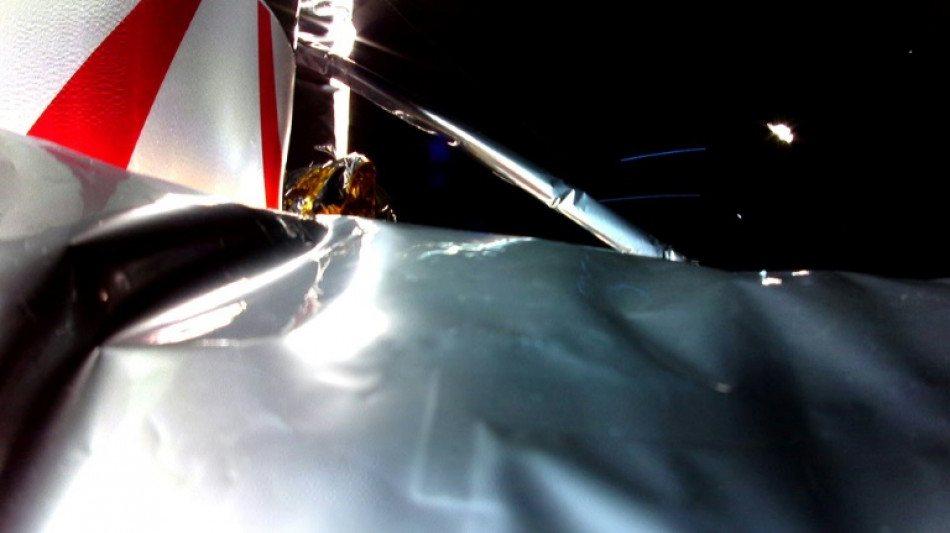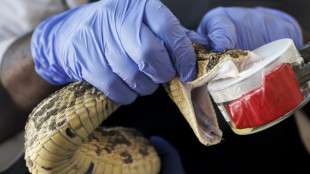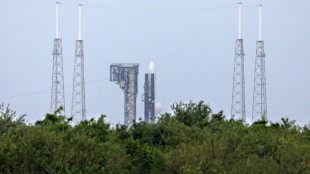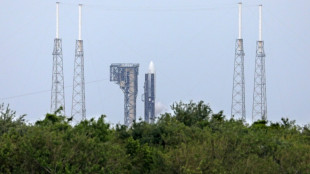
-
 Markets boosted as Trump softens tariff pain for auto firms
Markets boosted as Trump softens tariff pain for auto firms
-
Suryavanshi, 14, dubbed 'next superstar' after batting records tumble

-
 Australian doubles player Purcell accepts 18-month doping ban
Australian doubles player Purcell accepts 18-month doping ban
-
Kashmir attack unites political foes in India, Pakistan

-
 Croatia hotel toasts dizzying century of stars, sovereigns and champagne
Croatia hotel toasts dizzying century of stars, sovereigns and champagne
-
Kenya's desperate need for more snake antivenom

-
 Les Kiss in frame with Wallabies set to name new coach
Les Kiss in frame with Wallabies set to name new coach
-
Cavaliers scorch Heat, Warriors down Rockets in thriller

-
 Opposition wins Trinidad and Tobago election, returning Persad-Bissessar as PM
Opposition wins Trinidad and Tobago election, returning Persad-Bissessar as PM
-
Study sheds light on origin of Australia's odd echidna

-
 France tries Syrian Islamist rebel ex-spokesman on war crime charges
France tries Syrian Islamist rebel ex-spokesman on war crime charges
-
Trump boasts of 'fun' 100 days, but Americans disenchanted

-
 Elitist no more, caviar is turning casual
Elitist no more, caviar is turning casual
-
Amnesty accuses Israel of 'live-streamed genocide' against Gaza Palestinians

-
 Inter slump puts season at risk ahead of daunting Barca trip
Inter slump puts season at risk ahead of daunting Barca trip
-
Power returns to most of Spain, Portugal after massive blackout

-
 'I have hope': Vietnam Babylift survivor's search for birth mother
'I have hope': Vietnam Babylift survivor's search for birth mother
-
US climate assessment thrown into doubt as Trump dismisses authors

-
 Venezuelan president slams US over little girl's 'abduction'
Venezuelan president slams US over little girl's 'abduction'
-
Hard-right upstarts eye big gains in local UK polls

-
 Skulls, smoke and spirits: Thai ceremony for the unclaimed dead
Skulls, smoke and spirits: Thai ceremony for the unclaimed dead
-
Canada's Carney: political newcomer who says he's best in a crisis

-
 Cavaliers scorch Heat to seal series sweep
Cavaliers scorch Heat to seal series sweep
-
Dead salmon create election stink on Australian island

-
 Mic check: Singapore's podcast boom amplifies opposition voices
Mic check: Singapore's podcast boom amplifies opposition voices
-
Markets rise as traders gear up for earnings, key jobs data

-
 Congress passes 'revenge porn' ban, sending it to Trump
Congress passes 'revenge porn' ban, sending it to Trump
-
Spain and Portugal work to restore power after massive blackout

-
 Less-thirsty rice offers hope in drought-stricken Chile
Less-thirsty rice offers hope in drought-stricken Chile
-
Yamal stardust could give Barca edge on Inter Milan

-
 Coca-Cola Europacific Partners plc Announces Q1 Trading Update & Interim Dividend Declaration
Coca-Cola Europacific Partners plc Announces Q1 Trading Update & Interim Dividend Declaration
-
Trump targets US 'sanctuary cities' in migrant crackdown

-
 Mexico agrees to send water to US after Trump threatens tariffs
Mexico agrees to send water to US after Trump threatens tariffs
-
Amazon launches first Starlink-rival internet satellites

-
 US lost seven multi-million-dollar drones in Yemen area since March
US lost seven multi-million-dollar drones in Yemen area since March
-
Bucks blow as Lillard suffers torn Achilles: team

-
 Putin orders three-day truce amid new US warnings
Putin orders three-day truce amid new US warnings
-
Real Madrid's Ancelotti agrees Brazil deal - reports

-
 ChatGPT adds shopping help, intensifying Google rivalry
ChatGPT adds shopping help, intensifying Google rivalry
-
Global stocks mixed amid trade hopes as markets await tech earnings

-
 Commanders heading back to D.C. after inking $3.7 bln stadium deal
Commanders heading back to D.C. after inking $3.7 bln stadium deal
-
US warplane falls off aircraft carrier into Red Sea

-
 Feisty Arteta urges Arsenal fans to 'bring boots' to PSG Champions League clash
Feisty Arteta urges Arsenal fans to 'bring boots' to PSG Champions League clash
-
Bucks blow as Lillard suffers ruptured Achilles: reports

-
 No power, no phone, no transport -- Spain in a panic
No power, no phone, no transport -- Spain in a panic
-
US warplane went overboard into Red Sea: Navy

-
 'Like a dream' as IPL's 14-year-old Suryavanshi becomes youngest to hit T20 ton
'Like a dream' as IPL's 14-year-old Suryavanshi becomes youngest to hit T20 ton
-
Luis Enrique says PSG have improved since October Arsenal loss

-
 UN food, refugee agencies warn of huge cuts after funding losses
UN food, refugee agencies warn of huge cuts after funding losses
-
Trump trade war dominates BRICS meeting in Brazil


Doomed US lunar lander's space odyssey continues...for now
Is it the little spaceship that could?
A private US lunar lander that's been hemorrhaging fuel since an onboard explosion at the start of its journey is somehow still chugging along, snapping selfies and running science instruments as it continues its journey through space.
Though Astrobotic, the company that built the Peregrine robot, has said a controlled touchdown on the Moon is no longer possible, it hasn't ruled out a so-called "hard landing" or crash -- a prospect that has space watchers gripped.
"Peregrine has now been operating in space for more than 4 days," Astrobotic said in its latest update posted on X on Friday, adding it remained "stable and operational."
The rate of fuel loss has steadily diminished as the pressure inside its tank drops, meaning the company has been able to extend the spacecraft's life far longer than it initially thought possible.
Meanwhile, the US, German and Mexican space agencies have been able to power on the scientific instruments they wanted to run on the Moon.
"Measurements and operations of the NASA-provided science instruments on board will provide valuable experience, technical knowledge, and scientific data to future CLPS lunar deliveries," said Joel Kearns, deputy associate administrator for exploration for NASA.
Commercial Lunar Payload Services is the experimental NASA program under which the space agency paid Astrobotic more than $100 million to ship its hardware of Peregrine, as part of a strategy to seed a commercial lunar economy and reduce its own overheads.
Astrobotic is the third private entity to have failed in a soft landing, following an Israeli nonprofit and a Japanese company.
- 'Shots on goal' -
Though it hasn't worked out this time, NASA officials have made clear their strategy of "more shots on goal" means more chances to score, and the next attempt, by Houston-based Intuitive Machines, launches in February.
Astrobotic itself will get another chance in November with its Griffin lander transporting NASA's VIPER rover to the lunar south pole.
For now, the Pittsburgh-based company is staying tight-lipped on Peregrine's intended destination, leaving enthusiasts to make their own calculations.
Amateur astronomer Tony Dunn used publicly available data provided by NASA's Jet Propulsion Laboratory (JPL) to plot out the spaceship's current course, posting a graphic on social media platform X showing it would collide with the Moon on January 23.
But "it's really anybody's guess as to what is actually going to happen because of the leaking fuel," which could easily push it off course, he told AFP.
Or, Astrobotic could intentionally point Peregrine another way, such as flying by the Moon and shooting for interplanetary space.
While a hard lunar landing might satisfy some of Astrobotic's clients, such as those flying human ashes and DNA to the Moon, it could anger others like the Navajo Nation, which had called that cargo a "desecration" of the celestial body.
"I think it would be a shame if they completed their failed mission by littering the surface of the Moon with debris," Justin Walsh, a professor of art history, archaeology, and space studies at USC told AFP, adding that humanity had left some 180 tons of material on the surface since the first Soviet impactor crashed in 1959.
D.Cunningha--AMWN
